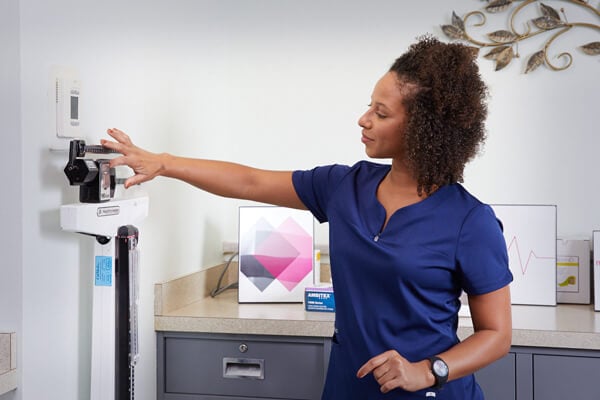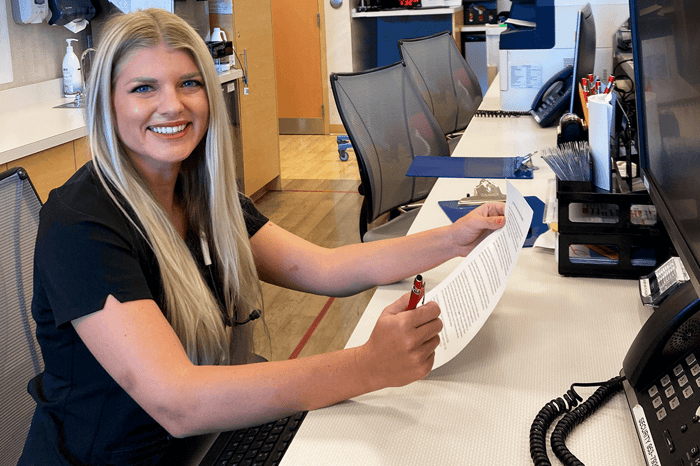Written by Rebecca Cook, BSN, RN
Did you know that nursing is a great job for people with attention deficit disorder (ADD) or attention deficit hyperactivity disorder (ADHD)? The medical field has been identified as an excellent career opportunity for people with ADD or ADHD because of its frequent busyness and the need to continuously change tasks.
One nurse that I spoke to confirmed this belief, stating that nursing was a perfect fit for her because, “moving from one ‘most important’ task to the other is an ADD’ers dream come true…no time to stop and think and/or overthink一just move from one fire to the next,” says Amber, RN BSN.
Despite perceived struggles with organization and staying focused, those with ADD or ADHD may be more creative thinkers, stronger problem solvers, and more empathic than their neurotypical coworkers.
However, it’s important to stay as organized as possible when moving from fire to fire. If you find that this is something that you struggle with, the following habits may be beneficial to you.
1. Check and Re-Check
Everyone must check and re-check orders. This is especially true if you tend to skim through orders when reading or have a history of missing details. Slow down, read carefully, and then read through it again before completing the order to ensure you understand it correctly and don't overlook anything.
2. Develop a “Nurse Brain”
Nurse Brain is a technique for organizing your schedule and tasks on a sheet of paper to reference throughout the day. Just like everyone’s actual brains are different, so are our “nurse brains.” Julia Tortorice, RN, MBA, MSN, and CFO of CEUfast, Inc described the “nurse brain” as “a popular tool among nurses who want to have quick notes of processes, a template they can reference for reporting, reminders, shift rotations. The sky’s the limit. It can take some time to develop your ideal report sheet, but that’s okay; accept that it may need to be tweaked over time.”
3. Routines, Routines, Routines
Try to keep your schedule as regular as possible. Consider arriving at work a few minutes earlier to start organizing your day. Find a quiet corner with fewer distractions to take report. Try to prepare as much as possible before a shift by laying out your favorite, most comfortable scrubs uniform or packing lunch to make getting ready the next day less stressful.
4. Advocate For Yourself
We spend much of our career advocating for our patients, but we can’t forget to advocate for ourselves. If you are comfortable, share your struggles with your co-workers or manager and talk to them about ways they can support you during your shift. Taking just five minutes to decompress throughout the day can do wonders to help with feeling overwhelmed.
5. Treatments
Talk with your medical provider about options regarding medications and/or therapy to help you handle the day-to-day stresses of living with this type of neurodivergence.
6. Exercise
Regular exercise is another great tool in the treatment of ADD or ADHD.
Tools for you and your patients
The above listed habits will not only help you throughout your workday, but can help you best care for your patients with ADD or ADHD. Knowing how they may be either easily distracted or hyperfocused on something can assist you in preparing their environment so they may best absorb what you are trying to teach them. Sometimes, this looks like giving them time to process things, reviewing things again during a quieter time on your shift, or providing information in written form for later reference. Talk with your patients about their preferred method of receiving information.
Being a nurse brings its own level of stress and having ADD/ADHD can exacerbate that. It’s important to find ways to manage stress to avoid early burnout and decrease the potential for mistakes. The advice reviewed in this article are just a few tools that can be used. I encourage you to review them and reach out to your peers and provider if you’re struggling in any way.
About the Author:
Rebecca Cook has been a registered nurse for 16 years and has experience in ER, Case Management/UR, hospice, and home health. She is the owner of Nurses Notes, LLC. When not at work she enjoys spending time with family and friends. Special thanks to Amber Pfalzgraf, RN for allowing her brain to be picked for the writing of this article.
References:
-
ADD: Best Jobs For People With Attention Deficit Disorder | Money
- How to Be a Successful Nurse While Managing Y | CEUfast.com Blog




